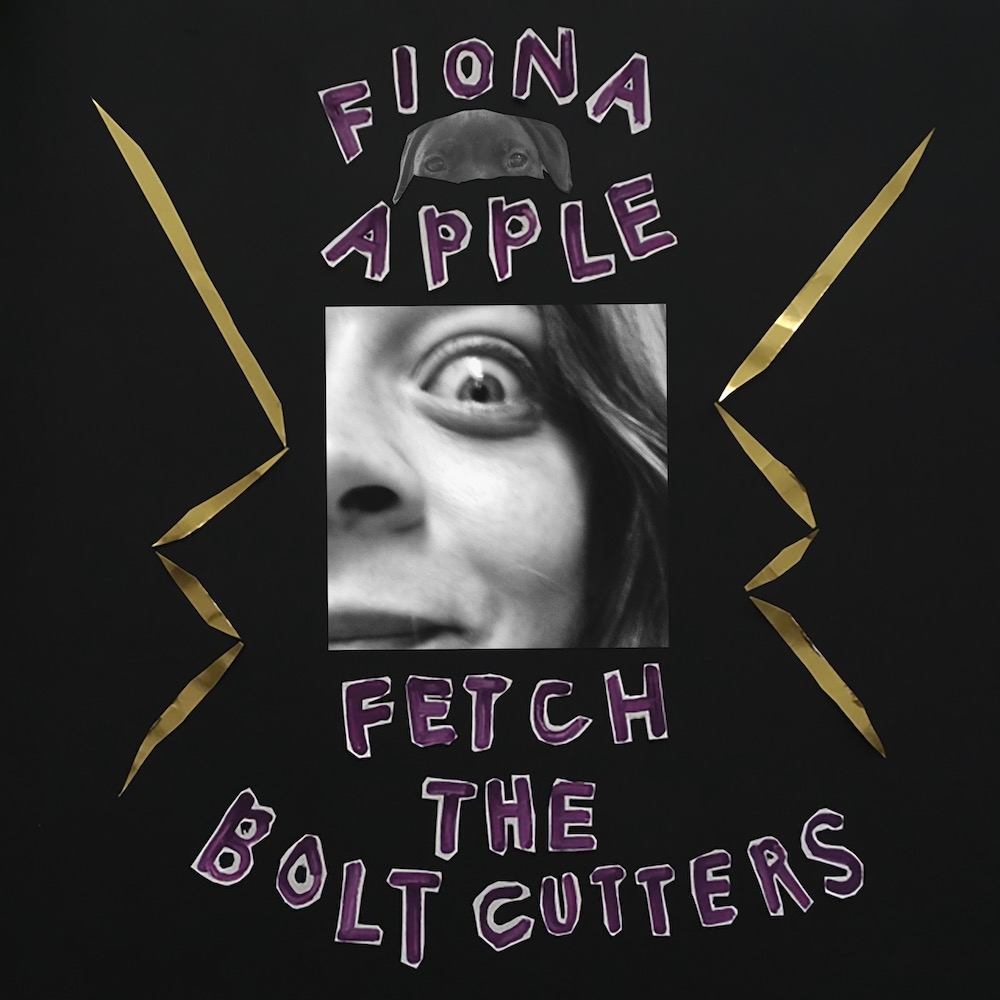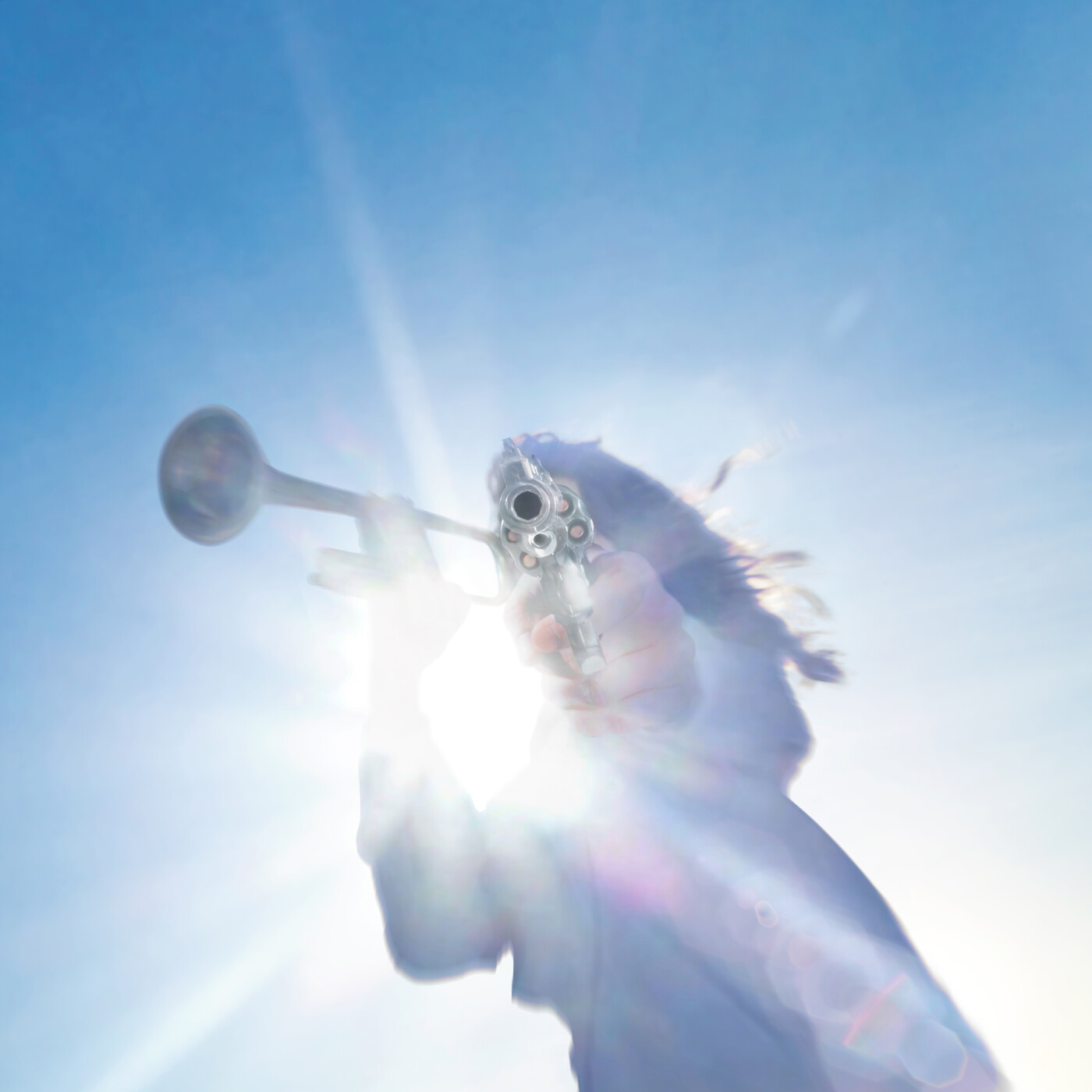"Blast the music! Bang it, bite it, bruise it!" This is Fiona Apple near the end of "I Want You To Love Me," the first song on her new album Fetch The Bolt Cutters. It is not idle rhetoric. Apple delivers those lines in a dizzy spiral of syllables, pushing against the stormy hammering of her own piano. When she gets to that climactic exhortation, a massive bass drum thumps down on every verb: Bang, bite, bruise. The song is a demand to be loved, an urgent and voracious roar. It's not a song that aims for prettiness. It doesn't sound like any worn-in notion of what a love song is supposed to be. Instead, it leaps right in, thunders out new time signatures, and loses itself in the animal need at the core of so many love songs.
During the first half of "I Want You To Love Me," Apple uses a tender, almost conversational half-speaking register. She tries to be reasonable. She even tries to keep things in vast planetary perspective: "I know that time is elastic/ And I know, when I go, all my particles disband and disperse, and I’ll be back in the pulse/ And I know none of this will matter in the long run." But she also knows what she needs, and as the song unfolds, it picks up intensity. Her contralto sharpens into a growl. She stretches out the word "you" until it becomes almost a Buddhist chant. Then her voice speeds up into an almost-rap cadence. On the outro, even as the song is fading out, Apple does quavering Yoko Ono yip-whoops. "I Want You To Love Me" is an overwhelming, head-spinning piece of music. By the time its four minutes are up, you might want to go lie down, to process what you've just heard. Too bad. You're just getting started.
All through Fetch The Bolt Cutters, Apple makes music that blasts and bangs and bites and bruises. Fetch The Bolt Cutters is a delirious yawp of a record, a singular plunge into a whole galaxy of feelings. People are going to tell you that Fetch The Bolt Cutters is a percussive record, and that's true, but that doesn't get at the half of it. A lot of percussive music is built around the idea of dancing, of guiding and channeling the rhythms of the human body. Fetch The Bolt Cutters is not like that. Instead, Fetch The Bolt Cutters plays as a wild, feverish attempt to mirror the chaos that goes on in the human mind when it's at its most overheated. It's a freewheeling and explosive brain-chemistry record -- a beautiful and terrifying thing.
It's been eight years since we last heard from Fiona Apple -- the longest span of time ever between her not-exactly-frequent albums. (The endless breaks between Fiona Apple albums just keep getting longer, as if Apple is giving the world the time it needs to understand what she just said.) In her New Yorker profile of Apple, Emily Nussbaum writes that Apple, in recent years, has mostly only left her Venice Beach home to take her dog on morning beach runs. Even Largo, the Los Angeles venue that Apple once feted through song and that she once used as a clubhouse, has had to go on existing without Fiona Apple; she hasn't been there in five years. Those of us who are only just now feeling the intense anxiety and claustrophobia of quarantine can only begin to understand the sensations that Apple displays on Fetch The Bolt Cutters. She's been living in this for a lot longer than we have, albeit for different reasons.
In that New Yorker story, Nussbaum tells stories about Apple and the members of her band -- elegantly unhinged singer-songwriter David Garza, jazzbo-ish former Soul Coughing bassist Sebastian Steinberg, busily roiling drummer Amy Aileen Wood -- marching around Apple's house, banging on everything that could be banged on, even the bones of Apple's beloved late dog. At virtually every moment on Fetch The Bolt Cutters, it feels like things are being banged on, and it's hard to know what. There are always layers of banging going on -- thuds, tings, claps, snare-rolls, rattles, things falling onto other things.
The piano, Apple's instrument, is essentially a form of percussion. Someone bangs on a key, and then a hammer bangs on a string. It's easy to forget that, to think of the piano as the instrument of hotel lobbies and cocktail bars. Early in her career, Apple sometimes evoked that idea of what a piano was, coming off as a teenage torch-song balladeer. But on Fetch The Bolt Cutters, Apple really smashes the shit out of her piano, forcing you to remember exactly what's happening inside this instrument. Everything on the album becomes a form of banging: The bass-plucks, the organ melodies, the voices. There are voices all over Fetch The Bolt Cutters, whooping and chanting and falsetto-growling and hiccuping and screeching and gibbering. Sometimes, those voices form into a rough choir. But the chaos is the point -- the feeling of wanting to jump out of your own skin.
On "Shameika," Apple opens up by describing herself as a high-school kid who's already turning the sounds within her body into a sort of music: "I used to walk down the streets on the way to school/ Grinding my teeth to a rhythm invisible." The song opens up into something else. Apple describes herself as a kid totally apart, someone who cannot function within a social system. In a clipped, staccato half-rap, she snarls even when she's deep in her memory: "I didn't smile because a smile always seemed rehearsed/ I wasn't afraid of the bullies, and that just made the bullies worse." Days creep by as slow-motion torture: "In class, I’d pass the time drawing a slash for every time the second hand went by/ A group of five done 12 times was a minute." But one girl throws her something like a lifeline: "Shameika says I had potential." Apple barely knew this girl, and she'll presumably never see her again, but, decades later, Apple still carries this line with her as a totem. When she remembers what Shameika once said, the chaos drops away, and Apple's voice lightens. It doesn't last, but that moment of transcendent delight still sings out.
This is how Let The Bolt Cutters works: Apple digging into these moments of stress and confusion and need and acceptance, then finding ways for her music to properly convey those feelings. Apple has always been an elegant writer, and on Fetch The Bolt Cutters, she has bars: "I would beg to disagree, but begging disagrees with me," "I’ve been used so many times, I’ve learned to use myself in kind."
At various points, Apple skewers an ex with poetic precision: "I’d like to buy you a pair of pillow-soled hiking boots to help you with your climb/ Or rather, to help the bodies that you step over along the route, so they won’t hurt like mine." She gives voice to the irrational moments of hatred that dog every relationship: "Your face ignites a fuse to my patience/ Whatever you do, it’s gonna be wrong/ There’s no time to interrupt the detonation/ Be good to me before you’re gone." She describes the kind of feelings that we all sometimes have when we scroll through Instagram: "I resent you for being raised right/ I resent you for being tall/ I resent you for never getting any opposition at all/ I resent you for having each other/ I resent you for being so sure/ I resent you for presenting your life like a fucking propaganda brochure."
These are senior-yearbook quotes, block-of-text tattoos. They are beautiful and perfectly crafted sentences. But writing out things like that isn't enough for Apple. Rather than just singing those words, she's made an album that sounds like the same kind of internal bedlam that those words capture. Sometimes, Apple's beautiful words can become mere sound effects, as when she delivers the phrase "yet another woman to whom I won’t get through" in a sonorous mutter, letting the words slur into each other. She takes a great lyric, and she turns it into a bassline. Elsewhere, those lyrics become canary-chirps, or feral grunts, or syllabic drumrolls. Fiona Apple isn't a rapper, but she has a rapper's sense that words can be music, too -- that language does things musically that could never translate to the page.
Fetch The Bolt Cutters does not belong to any genre I can name. It doesn't even sound like any past Fiona Apple album, save perhaps the furthest-out moments of When The Pawn... or The Idler Wheel... With Fetch The Bolt Cutters, Apple has made something that resolutely refuses to fade into the background, to become a soundtrack to someone else's moment. Instead, she's made music that demands attention.
In the few days I've been living with Fetch The Bolt Cutters, I've sometimes found it a little exhausting. I've missed the florid, welcoming beauty that Apple once wrote. But it's a mistake to expect Fetch The Bolt Cutters to conform to past Apple glories, just as it's a mistake to miss the new kind of beauty that she conjures here. The album chases different horizons. You need to summon the mental and emotional energy to engage a record like this on its own level, and a record like this rewards you for doing that work. There's nothing safe about this album. It crackles and sputters with nervous energy. And even at its lowest moments, there's a joy to it. Apple knows she's inventing new shapes and forms, and that exhilaration always shines through.
"Heavy Balloon," for instance, is a song about depression, about the way that depressed people can start to treat their depression like a friend or a plaything. Lyrically, it's about as bleak as bleak can get: "People like us get so heavy and so lost, sometimes/ So lost and so heavy that the bottom is the only place we can find." But that people like us is key. Apple isn't just singing for herself; she's singing for everyone else who knows how that feels. It's the kind of song that lets some of us know we're not alone. When Apple hits the hook -- "I spread like strawberries/ I climb like peas and beans" -- she becomes forceful and defiant, and she invites everyone else to share in that.
At times, Fetch The Bolt Cutters is a spittingly angry record. At various points, Apple may be addressing the kind of deeply shitty and snarked-out attention that half-interested parties gave her when she was still a teenager: "All I could hear was the noise that people make when they don’t know shit/ But I didn’t know that yet," "Maybe she spent her formative years dealing with his contentious fears and endless jeers at her endless tears." At others, she gets at deeper and darker rages: "Good mornin', good mornin'/ You raped me in the same bed your daughter was born in." But even there, she's exultant. She's winning, motherfucker. In Fetch The Bolt Cutters, we can hear the euphoria of a great unburdening.
For months, Fiona Apple was maddeningly vague about when we might get to hear Fetch The Bolt Cutters. She didn't want to have to go back to living in public, an ordeal that had utterly drained her at different points of her life. Earlier this month, though, Apple announced, via dog-running-on-beach video, that Fetch The Bolt Cutters would be in the world sooner than anyone could've hoped. While other stars are running away from the pandemic, pushing back album releases into the mysterious and terrifying future, Apple decided that she'd dive right in. "They are telling her she should release the album in October," said Apple's friend, housemate, and occasional spokeswoman Zelda Hallman. Along with that, we got a video of Apple's face: "Should I release it? Like, soon? Like, really soon?" And then, whispering: "I think I'm gonna."
It's a beautiful, conspiratorial moment. We're all dealing with some bullshit right now. Nobody makes better music for dealing with bullshit than Fiona Apple. She knew how many people needed this from her, and she took visible pleasure in giving it to us. She knows what she's done here. Fetch The Bolt Cutters is a wild, frenzied, ecstatic gift of an album. We're lucky to have it. Blast the music.
Fetch The Bolt Cutters is out now on Epic.
https://twitter.com/zeldahallman/status/1245481114652692481?ref_src=twsrc%5Etfw






